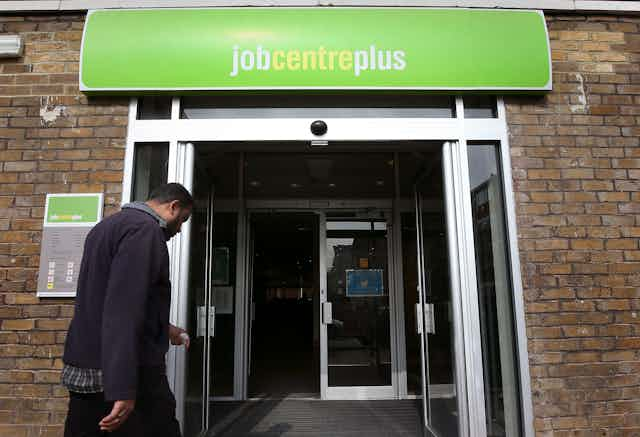Much of the recent debate and criticism of Universal Credit has focused on the waiting times for those who migrate on to the new benefit, and the debt this is causing new recipients. Yet, beyond the issues associated with moving people onto Universal Credit, there remain deep, unaddressed structural problems with its design and implementation, which we’ve highlighted in our recent research.
We are calling for a comprehensive review of the intensified and extended system of welfare conditionality – in which people’s benefits are dependent on them fulfilling certain conditions, such as looking for work. Our evidence shows the ineffectiveness of Universal Credit in moving people off social security benefits and into work.
The wider application of welfare conditionality within the benefit system for disabled people, those dealing with additional issues such as homelessness and alcohol or drug dependency, and for those people in work who receive Universal Credit, should be paused immediately pending a more fundamental enquiry.
Read more: Constant anxiety of benefit sanctions is toxic for mental health of disabled people
As part of our project we interviewed 58 Universal Credit recipients in England and Scotland who were among the first groups of people to receive the new benefit back in 2014. We interviewed them twice more over the course of the following two years.
We found that they were keen to work and demonstrated intense efforts to find jobs or enter self-employment. Despite constant and concerted efforts to find a job, the overall picture for these 58 people in terms of employment outcomes was relatively neutral: similar numbers transitioned from unemployment into paid work as from paid work to unemployment over the two years of our study.
But paid work was often elusive or transitory – more like a moving target than a destination. For most, the extensive and stringent conditionality of Universal Credit brought far more harm than good, both for those in and out of work. For unemployed recipients the benefit did not guarantee paid employment. For those in work – who were receiving Universal Credit as a replacement for the previous system of working tax credits – “progression” only meant pressure to take on more work without better conditions, higher pay or seniority.
Ineffective incentives and sanctions
The conditionality of Universal Credit has two core features. First, recipients suffer persistent and anxiety-provoking threats to withdraw essential income without notice via sanctions for minor infringements – such as being late for a Jobcentre Plus appointment. They feel at the mercy of unpredictable decisions beyond their influence. And second, heavy pressure is placed on them to apply for a high volume of job vacancies, some of which were inappropriate. This can involve regular long hours of documented job search activity – for example, via Universal Jobmatch, now called Find a Job – even for those already in paid work. Much of this mandatory activity is futile or counterproductive.

Poverty and debt were commonplace, worsened by the days waiting for Universal Credit to arrive and the requirement to repay hardship payments – discretionary loans paid to applicants in the period between making a claim and receiving the first payment. The people we interviewed had considerable movement into and out of work, with changes between jobs (including self-employment) and various jobs and varying hours of work. As one man in England told us:
The sanctions, I think, have held me back from being able to go and look for work… I wasn’t able to get out and look for work further away, but if I wasn’t sanctioned I would’ve been able to look for work in (a nearby city).
Illogical and damaging conditions
Universal Credit was intended to enable progression within paid employment. But its design assumes a full-time working model that is inappropriate for many mothers and carers, who need to balance paid work with unpaid care. Discretionary “easements” to limit hours of employment and job-seeking activities were often not in place for those who needed them. The people we interviewed mainly experienced the need for job progression as ongoing pressure to take on extra hours or additional jobs, even when suitable jobs didn’t exist in local labour markets or when the arrangements were very difficult to manage and the financial rewards were minimal. One man told us:
The lady was saying to me: ‘Well, you can get another job’, well, I can’t get another job because I work evenings and I work in the day on this job, so I haven’t got time to get another job.
Of the people we spoke to, 17 had already proven their intention to work by having a job at the start of the study and another 13 moved into work over the course of the study. Yet these recipients of Universal Credit who had a job were routinely threatened with sanctions and said they felt “criminalised” as a result. Although only a minority experienced an in-work sanction, the threat of sanction felt very real to most, despite their compliance.
Tangible support for improving job prospects or progression was largely absent. Many interviewees wanted access to voluntary support without the threat of sanctions. The claiming process for Universal Credit is digital. Face-to-face appointments with a job coach were difficult to request, cursory in nature, but mandatory and inflexible if scheduled by Jobcentre Plus. The primary focus was on ensuring compliance with the requirements of the Claimant Commitment and disciplining recipients through the threat or use of benefit sanctions.
Although Universal Credit offers better access to support for part-time workers, and smoother transitions in and out of work than the previous system, these advantages are undermined by benefit rates that force people to live below the poverty line, long waits for the first payment and inadequate wage top-ups, which perpetuate in-work poverty.
The conditionality within the system is intended to increase the supply of workers, but local labour markets do not offer jobs for all who want them and underemployment persists. The sanctions systems is far too harsh and in-work conditionality is fundamentally flawed. Universal Credit needs to be redesigned to enable people to get the support they need and deliver its promises to make work pay and prevent poverty.

